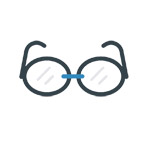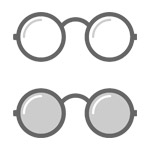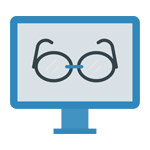If you wear glasses or contacts (and in some cases, even if you don’t) and you work at a computer for several hours per day, your eye doctor may recommend computer glasses to help reduce eye strain and protect overall eye health. These glasses are different from traditional corrective lenses in a few very important ways.
Here, you’ll learn all about computer glasses and the benefits they can provide.
Do You Need Computer Glasses?

To determine whether you’re a candidate for computer glasses, your eye doctor will perform an eye exam and ask you some questions about your daily routine. If you’re experiencing symptoms related to computer eye strain or CVS, and if you regularly work in front of a computer for several hours a day, you are likely a good candidate for computer glasses. If you are age 40 or older, you may be affected by a condition known as presbyopia, which describes the gradual decline of your eyes’ ability to adapt to varying distances.
If you’ve recently purchased reading glasses, you’re also a very likely candidate for computer glasses.
Can’t You Just Wear Your Reading Glasses?

Reading glasses are designed to magnify text to a degree, but only within a very short distance. These glasses make it easier for your eyes to adjust their focus when you need to read small print that is at normal reading distance – usually about 14 to 16 inches. To reduce computer eye strain, most eye doctors will advise sitting anywhere from 20 to 40 inches from your monitor, depending on the size of the screen. Your reading glasses are not powerful at this distance, and sitting closer to the screen may make eye strain worse, even if you’re wearing your glasses. For this reason, you should never use your reading glasses as computer glasses; they simply were not designed for the same purposes.
The good news is that you usually can use your computer glasses as reading glasses. They work in much the same way; they make it easier for your eyes to focus at varying distances and with various font sizes, but they have a much longer range of vision.


